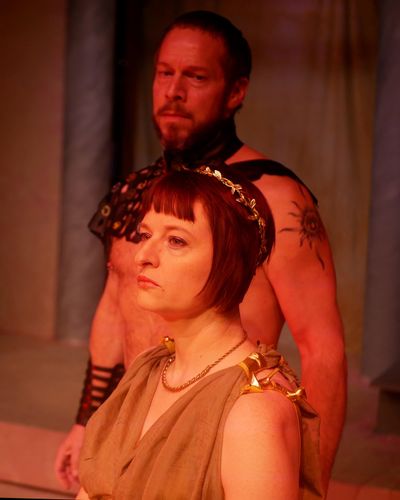Theater review: ‘Hecuba’ at Stage Left makes for an unforgettable night

Stage Left Theater’s production of Marina Carr’s “Hecuba” is not a show I’ll soon forget.
House lights dimmed as a funereal monody played over the empty stage. Hecuba (Caryn Hoaglund), her daughters, Cassandra (Dana Sammond) and Polyxena (Kailie Jackson), and her daughter-in-law, Andromache (Erin Anders) file into the ruined throne room followed by the remaining Trojan women. Defenseless after a decade of war, there is nothing left to do but wait for the enemy Greeks to cart them away.
Hecuba speaks directly to the audience, narrating in near disbelief as the silent players slowly reenact the litany of bloody events leading up to that moment. The wise choice to pantomime the more disturbing set pieces alluded to in the text allowed the audience to give more consideration to the dialogue, the unusual style of which might otherwise have been difficult to track. The cast gave such intelligent care to the imaginary props throughout the show that I stopped noticing they weren’t there.
The text is almost entirely expository. Various characters take turns explaining the events of the play to the audience, and with each new narrator, we gain a different perspective; some prove more honest than others. The plot increases in complexity as the explanations start to diverge and conflict, but overall it remains easier to follow than I had expected.
Hoaglund convincingly embodies all of the pride, desperation and simple humanity of this newly vindicated Hecuba. Her outbursts and compellingly varied reactions felt natural and appropriate wherever they fell.
Carr’s Cassandra is another clear departure from the mad prophetess of Euripides’ “Hecuba.” Instead of unhinged, she seems either sadly resigned to the fate of her people or spitefully pleased at every new hardship. It wasn’t clear which was intended, but, nonetheless, the development of Sammond’s characterization was one of the more interesting to watch.
The play focuses primarily on the plight of women and children in war, but Agamemnon (Michael Schmidt) and Odysseus (Paul J. Watts) still have their moments. Their argument over Polyxena’s sacrifice and Agamemnon’s tortured account of his own daughter’s sacrifice and the powerlessness he continues to feel afterward were remarkably engaging.
Jackson gave a haunting, standout performance as Polyxena. Her intensely moving delivery and admirable stage presence held attention whether she was speaking or silent.
The character of Teleute (Michelle Lundy), created for this production by show director Rebecca McNeill, served to guide the dead to the afterworld. Lundy’s Teleute was a quiet comfort throughout. Seeing her carry the body of Andromache’s child up the temple steps would be enough to make anyone shed a happy tear.
Having subtracted all of the supposed righteousness and masculine nobility of the original Euripides play, death becomes less of a thing worthy of vengeance and more of a welcomed blessing amidst the post-war carnage of this otherwise dark and dispiriting narrative.